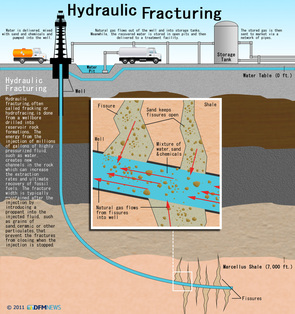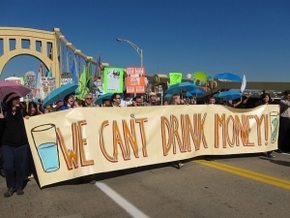 Emily Collins, medical student at Keele University If you’ve seen the news recently, you’ll probably have heard many loud opinions battling to have their say on fracking. Fracking is a process that is unfamiliar to most of us, but which could have big effects on our world, depending on who you listen to. So what is it? And why is it such an important issue? Fracking (hydraulic fracturing) is a feat of engineering aimed to increase the yield of natural gas gleaned from the earth, in order to be used as fuel. As a fossil fuel, formed when marine plankton and ancient plants trapped sunlight energy and carbon over millions of years, natural gas is an unsustainable energy source and burning it produces carbon dioxide. Drills dig deep into the earth, vertically then horizontally, while pumping in water and chemicals at high pressures to open up fissures in the shale rocks way down deep: this frees trapped gases. These are then captured and piped off at the earth’s surface, ready to use as fuel (helpful video: http://www.bbc.co.uk/news/world-us-canada-23320540.) Having been widely used across the US, the government has recently announced the lifting of a temporary ban of fracking throughout the UK which has sparked controversy and protests, such as those in Balcombe and elsewhere. Why the enthusiasm? Hard to reach oil and gas can be accessed by fracking. It has been estimated that there is as much as 1,300 trillion cubic feet of shale gas underneath the UK – a tenth of which, if extracted, would be the equivalent of 51 years’ gas supply. (1) There are two main possible benefits: first, UK gas prices could be driven down, as they have been in the US. This could be a big boost in the days of our troubled economy, where many families struggle with meeting the rising cost of energy bills – but as this letter to the FT from a senior (republished here) explains, even using very optimistic assumptions only investors in the extraction companies and the Exchequer are likely to benefit, unless gas imports are penalised. At the same time, the cost of solar panels has dropped 80% due to a surge in Chinese production. Is it really just a coincidence that Osborne’s father-in-law is an oil and gas lobbyist?  From an environmental perspective, electricity can be generated from natural gas at half the CO2 emissions of coal (potentially at least) so, compared to coal it could plausibly be a step in the right direction. But there are big question marks on wheter this is true – see below – and is coal really the benchmark we should be using in 2013? Another potential benefit of fracking – especially in the context of today’s record unemployment - is the creation of jobs in Britain. David Cameron claims that as many as 74,000 jobs could be supported by the growth of this industry (1). If true, this would be hard to overlook, although many of them would be temporary. But the job creation argument applies just as strongly to investment in the green economy, as the Green Is Working campaign and this report from the Green Alliance show. Even if realised, the benefits of fracking come with big risks, and could cause lasting damage to our planet and our health. Water usage and chemical contamination Fracking uses huge amounts of water – just one site requires millions of gallons of water. This will compete with water resources in areas which are already prone to and experiencing shortages, areas which are also expected to increase with climate change. Transport of these large volumes of water to and from fracking sites will also have environmental impacts. In addition, there is serious public health concern about the risk of water quality being affected, with a concern that carcinogenic chemicals such as benzene, toluene, xylene etc among many others, used in the water will leak and contaminate groundwater around the site. Earthquakes There are concerns that fracking can cause earth tremors. In 2011, two small earthquakes occurred in Blackpool following exploratory fracking. Several reports have been conducted into the matter and it remains possible that future fracking will lead to some tremors. However, a recent report from the Department for Energy and Climate Change claimed that the risks of structural damage from these tremors remain low, and the process has been given the green light, albeit with stringent regulations.  Climate change The science is telling us that we really need to keep most remaining fossil fuels in the Earth if we want to avoid catastrophic climate change, as highlighted by Bill McKibben's Do The Math talk (coming to the UK this Autumn in a 'Fossil Free' tour coordinated by People and Planet!) In that context, is fracking just a distraction from developing renewable sources of energy? Cameron, like Osborne, says ‘we’re not turning our back on low carbon energy’ - just using fracking to help meet our energy needs – but we could do that with sustainable energy too. Does the move just encourage continued dependence on fossil fuels, ‘one last fix’ before we change? As Friends of the Earth’s Head of Campaigns, Andrew Pendleton, said in reaction to the 2013 Budget: "This is yet another fossil-fuelled Budget.... Our economy desperately needs new ideas, but George Osborne is a 19th century Chancellor, using 20th century tools to fix 21st century problems". Natural gas is mostly methane – which is over 20 times more potent as a greenhouse gas than CO2 – and it has been found to leak from fracking sites in quantities much larger than originally thought. Burning fracked natural gas is only a greener alternative to coal burning so long as gas leakages into the environment are kept to a minimum, specifically below 2%. Studies predict, however, that leakages may be significantly higher, with a recent study in Utah finding a leakage rate of 9%. A New Scientist article published yesterday cites that if rates are around 10%, at the top end of estimates for the US, then the escaped gas would increase global warming until the mid 22nd century. The climate is a very complex thing: the same article also notes that side-products of burning coal, sulphur dioxide and black carbon, actually cool the climate to some degree and offset some of the warming created by the production of greenhouse gases – although they also have negative health effects. There’s a lot to consider when it comes to the debate about fracking. What damage to our planet is too much? Will fracking really be the solve-all economic miracle the government is claiming? The debate is open – what do you think?
0 Comments
|
Details
Archives
February 2019
Tags
All
|
 RSS Feed
RSS Feed
